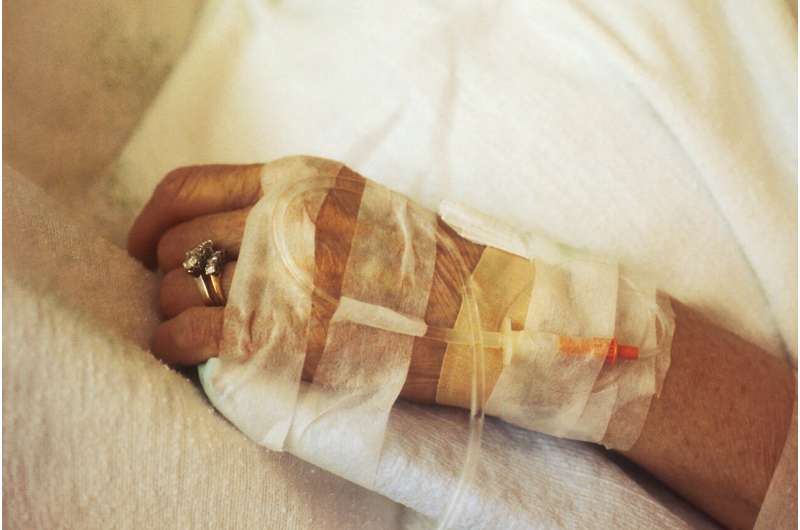This article has been reviewed according to Science X's editorial process and policies. Editors have highlighted the following attributes while ensuring the content's credibility:
fact-checked
proofread
Atezolizumab addition to chemotherapy after surgery does not improve survival for triple negative breast cancer: Study

Patients with triple-negative breast cancer do not benefit from the addition of atezolizumab to their post-surgery chemotherapy treatment, according to the results of a large phase 3 clinical trial presented at the 14th European Breast Cancer Conference.
Triple negative breast cancer, so-called because the cancer cells are not fueled by estrogen, progesterone or the HER2 protein, is harder to treat and more likely to spread to other parts of the body.
Previous research has suggested that adding an immunotherapy treatment to chemotherapy before surgery can improve survival for this groups of patients. The new results show that including atezolizumab—a type of immunotherapy—with chemotherapy after surgery does not bring the same benefits.
The ALEXANDRA/IMpassion030 study is a phase 3 clinical trial that included 2,199 people from 31 different countries with stage two or three triple negative breast cancer. Following surgery to remove their cancer, half of the patients were randomly assigned to be treated with chemotherapy plus atezolizumab, with the other half treated with chemotherapy.
The final analysis of the trial was presented by Dr. Heather McArthur, an Associate Professor in the Department of Internal Medicine and Clinical Director of the Breast Cancer Program at the Harold C. Simmons Comprehensive Cancer Center at UT Southwestern Medical Center in Dallas, Texas, U.S..
She said, "We know from a previous trial that including the immunotherapy treatment atezolizumab with chemotherapy prior to surgery is beneficial for patients with triple-negative breast cancer. The ALEXANDRA/IMpassion030 trial is the first study to look at the role of chemotherapy with or without atezolizumab post-surgery for early-stage triple-negative breast cancer."
Patients have now been monitored for an average of 32 months. Researchers found no improvement for patients treated with atezolizumab after surgery compared to those not treated with atezolizumab in terms of survival and remaining free of cancer. Among the patients taking atezolizumab there were 141 (12.8%) who had a recurrence or died. Among patients not taking atezolizumab, there were 125 (11.4%) who had a recurrence or died. This equates to a hazard ratio of 1.11 for patients taking atezolizumab.
Researchers also found no benefit when looking at different sub-groups, such as patients whose cancer had spread to the lymph nodes and patients with PD-L1 positive cancer, which is used as a marker of cancers that are more likely to respond to immunotherapy.
Dr. McArthur said, "This is a large international clinical trial looking at treatment for patients with triple-negative breast cancer. The results of this final analysis are important because they show that including the immunotherapy drug atezolizumab alongside chemotherapy does not help when it's given to patients following surgery. By extension, this also highlights the importance of treating triple-negative breast cancer with chemotherapy and immunotherapy prior to surgery, as per the current standard of care."
The final analysis also showed that the safety of atezolizumab, in terms of unwanted side effects, was consistent with other trials of the treatment. Among the patients treated with atezolizumab and chemotherapy, 54.3% experienced serious side effects. Among those treated with chemotherapy alone, 44.1% experienced serious side effects.
The co-chair of the 14th European Breast Cancer Conference is Dr. Fiorita Poulakaki, Head of the Breast surgery Department at Athens Medical Center Hospital, Greece, and Vice President of Europa Donna, the European Breast Cancer Coalition, and was not involved with the research. She commented, "We always hope that testing new treatment approaches will improve patients' outcomes. However, it's just as important to know when a new treatment added to one that is already in use one is not beneficial, as in this case, to make sure patients aren't subjected to a treatment that doesn't work and may cause more side effects.
"The results of this final analysis show that chemotherapy with atezolizumab after surgery does not improve disease-free survival for early-stage triple-negative breast cancer. This research therefore highlights the importance of the current approach of treating triple negative breast cancer with chemotherapy and immunotherapy to shrink the tumor before surgery. This is vital information for surgeons and medical oncologists who treat patients with this aggressive type of cancer."
More information: Abstract no: 1LBA, "Adjuvant chemotherapy with or without atezolizumab for stage II and III triple-negative breast cancer: final analysis of the ALEXANDRA/IMpassion030 phase 3 trial", Young Investigator Innovation Award and Oral abstracts, Wednesday 20 March.



















